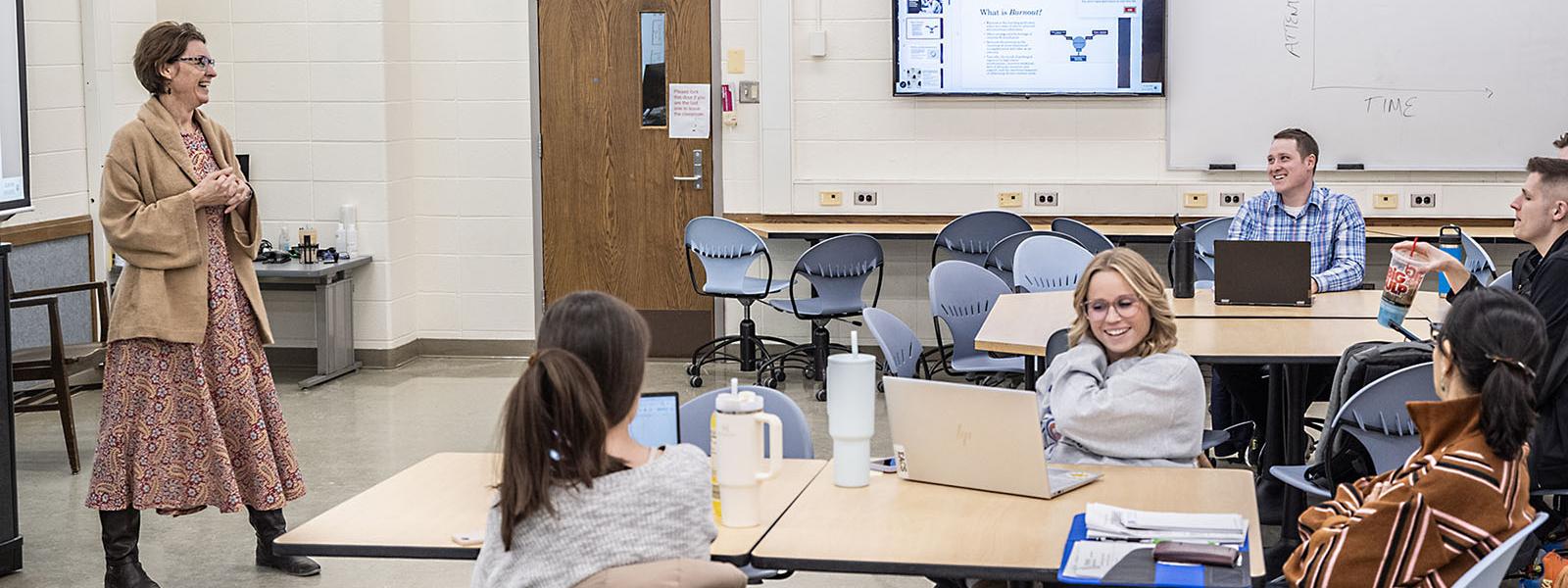
Transition to Teaching helps candidates adjust to new Indiana requirements
By Blake Sebring
March 27, 2025
Each year, elementary and high school teachers are tasked with more responsibilities regarding their students' well-being and its potential impact on their learning. This includes recognizing warning signs and reporting concerns. Being aware of potential abuse has always been a priority, but what if there are suspicions a student might be homeless or involved with criminal activity? Teachers are now required by law to report such possibilities.
So how do current and future educators keep up with all the new obligations they are presented by state legislatures and other governing bodies, particularly the 61 involved with Purdue University Fort Wayne’s Transition to Teaching program? These are professionals transitioning from other fields, often completing their training while actively serving in schools because there is such a drastic need for teachers. Candidates can finish the program in three to four semesters, depending on their specific areas.
Each semester, 10-15 TTT participants gather monthly in Neff Hall for 2½-hour training sessions to debate questions, study ideas, and ask for guidance from PFW faculty such as Shane Conwell, professor of educational leadership; Erin Baldauf, professor of education; and Rama Cousik, associate professor of special education. The current cohort is made up of 12 who meet for an hour before breaking into their specialties.
The changes they must assimilate can come quickly. A current student studied for six months last year to receive a reading certification needed for her license, but recent changes recent changes in Indiana law meant she had to battle for that training to count toward the current requirement.
Education majors at the undergraduate level have a semester to study these questions in designated classes, but TTT students must fit in the five seminars while taking other evening courses.
And diving into this important content is not easy to tackle after a full day of teaching. Recent discussions dealt with handling medical seizures, classroom management, and legal matters in education. There’s also uncertainty about how federal requirements may soon change. Following “No Child Left Behind” in 2002 and the “Every Student Succeeds Act” in 2015, many education officials believe a new mandate is possible.
The true goal of these seminars is to prepare teacher candidates, giving them the confidence to handle challenging situations and properly implement the policies.
“I believe that everyone—schools, parents, legislators, etc.—want what is best for students, and with that often comes a desire to `improve’ policy, which creates a moving target,” Conwell said. “The pandemic taught us as educators to be flexible and willing to adapt, and the same can be said about policy, as long as we continue to keep students and staff at the forefront.”
The ability to frequently adapt is a critical skill teachers must embrace to survive and thrive in the field, Baldauf said.
The teacher candidates want to comply, but the positions keep changing, meaning they need updates. There are also multitudes of resources, but guidance on which to follow is critical.
“For some, they go into teaching because of the influential teacher who made a difference in their life,” Baldauf said. “For others, maybe they come from a `family of teachers.’ In the TTT program, we often see people who were in fields that are more driven by money who have decided they want to do something meaningful.”
Cousik said most join the noble profession because it’s a calling, they love working with children—even the challenging ones—or they have an innate attitude to inspire kids to learn. The basics of why people become teachers are unchanged.
“There is no more fulfilling career, even with the challenges and shifting obligations,” Conwell said. “Teaching allows you to make a meaningful, positive impact in children’s lives, and by extension, make a difference in the world.”




